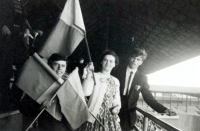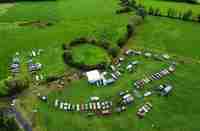This conflict did not begin on October 7th, and it did not begin with Hamas
Immediate and sustainable ceasefire urgently required
For years after I first moved to Galway, I would often pass by a wall along Headford Road which, in big bold letters, bared the phrase ‘SAOIRSE DON PHAILISTÍN’ (‘freedom for Palestine’).
I couldn’t tell you how long the graffitied message was there before I came across it, but in any case, throughout my time living in the city over the past few years, there it remained. At least, that is until March just gone, when it, and the entire wall it was sprawled on, was painted over.
The wall now features a brightly coloured mural with the phrase, ‘Take time. Care for your mind’. This arose as part of a HSE project, which saw similar murals put up on walls in Cork and Dublin too, all in an aim to raise awareness of mental health and available supports. It is far from a poor use for what was an otherwise empty wall, but obviously part and parcel of doing so meant doing away with the old ‘SAOIRSE DON PHAILISTÍN’ graffiti.
Again, I say old, but I really couldn’t say how long the graffiti had been there. It could’ve been painted mere days before I first noticed it, but arguably (and admittedly assuming a lack of regular graffiti removal by the county council), it theoretically could’ve been there for years and years, given just how long-standing the conflict it references is.
With all the recent events in Gaza, the amount of mainstream attention being focused on the Israeli-Palestinian conflict has reached a heightened level in the past few weeks. But the conflict is, of course, anything but recent; beginning in the mid-20th century, it is one of the longest and most protracted conflicts in modern history, one consisting of continual tension and devastating periods of death and destruction, interrupted only intermediately by a number of short-lived ceasefires – we just don’t normally talk about it this much.
Consider other notably violent periods in the decades-long conflict’s recent history, such as the 2012 or 2014 Gaza Wars, or even the outbreak of violence in May 2021. While far from not being publicised or talked about at all, these events didn’t seem to reach quite the same level of global attention and outcry we’re seeing now. And it would be impossible really to pinpoint why, but I imagine a significant factor has to be the scale of the death toll this time around, which, just to contextualise things, on day one alone had amounted to over half that attributed to the entirety of 2014’s 50-day war.
But beyond one Gaza war perhaps seeming more ‘newsworthy’ than another because of more lives being lost, when it comes to why it’s taken so long for the conflict in general to receive this level of global attention, there are numerous factors at play.
One major one, in my view at least, lies in the fact that there is often a tendency for western countries to not pay proper attention to atrocities happening in other places until things reach some sort of stomach-churning breaking point, which we have doubtlessly seen both on and since October 7th. But of course this is far from the only factor – this conflict is, after all, very often an extremely complex one to understand, and even to keep up to date with and find reliable information about, which can only feed into a general lack of awareness on the matter. Many people have also commented that this aspect of things is certainly not helped by certain countries, like the US, having vested interests in not stirring up discontent against Israel (with whom they have strong economic and historical ties), regardless of whatever the morality or actuality of the situation may be.
But as the violence continues, such countries are being put under more and more scrutiny in terms of how they are responding to the war. The UN General Assembly’s resolution last week calling for an “urgent, durable, and permanent humanitarian ceasefire in Gaza” has been a particular catalyst for this. The UK’s abstention has been heavily criticised by members of the public and politicians alike, with Scotland’s First Minister calling it “a shameful abdication of moral responsibility”. The US’s ‘No’ vote in line with Israel, though perhaps not wildly out of the blue, has received heavy criticism too.
Meanwhile, Ireland, along with the 119 others who made up the majority vote, voted in favour of a truce. This falls in line completely with the position we’ve held since the war broke out last month, with Irish attitudes – both those of the State and of the public – maintaining the importance of ending the rampant violence and the ongoing humanitarian disaster in Gaza. In fact, it falls in line with the position we’ve held long before the Hamas attack on October 7th; for decades, we have been calling for “a permanent and sustainable ceasefire”.
Notably, in addition to such a ceasefire, our position historically has also involved calling for lifting the blockade on Gaza and the establishment of a two-state solution based on the 1967 borders (before the Six Day War saw Israel almost quadruple its territory) – in other words, our position historically has consistently leaned a lot more pro-Palestine than a lot of countries, at least certainly when it comes to the ones we’re normally aligned with. In fact, in 1980 we became the first EU state to declare that peace “had to be based on a fully sovereign State of Palestine” and we have directly supported the Palestinian people through direct humanitarian aid for the past two decades.
It feels fair to assume that our position, particularity when it comes to the occupation of Palestine and our support of Palestinian sovereignty, must stem significantly from our own history with occupation. It is consistent with our long-established history of providing aid to colonised, previously colonised, and otherwise disadvantaged or impoverished countries.
The nature of the recent heinous acts committed by Hamas has stirred up a lot of anti-Palestinian sentiment and backlash for those who speak in defence of Palestinian sovereignty or those who have begun to criticise the extent of Israel’s response in the weeks since, such as Leo Varadkar’s recent comments which suggested that as opposed to self-defence, Israel’s recent actions are “something more approaching revenge”.
The attack on October 7th, and the scale of the antisemitism that fuelled it, is absolutely sickening. It has been reported as the deadliest single day for the Jewish community since the Holocaust. This attack and Hamas in general need to be expressly condemned, and such condemnation cannot be skipped over out of worry around how it may be falsely interpreted as a political Israeli-Palestinian stance. This condemnation should be seen less as political, but human.
Equally, it is important to acknowledge the fallout of the Israeli response and also all that preceded October 7th in terms of what Israeli occupation has truly meant for Palestine over the past decades, the scale of death and destruction.
At the start of this article, I mentioned the ‘SAOIRSE DON PHAILISTÍN’ graffiti I used to pass by on Headford Road. There is a reason it sat painted there for long before recent events brought this conflict to the forefront of people’s attention. This conflict did not begin on October 7th, and it did not begin with Hamas.
This week marks a month into the Israeli-Hamas war, and the scale of all the devastation that has come from it is nothing short of heartbreaking.
I hope it goes without saying my heart goes out to all those affected, that I understand I can’t begin to fathom the extent of the pain or the horror. As complex as all that has come before this conflict is and as multi-faceted as both the perpetrators of its innumerous incidences of violence and the victims of that violence are, the solution which needs to come about before anything else is comparatively simple – an immediate and sustainable ceasefire. There is no telling when and if such a ceasefire could realistically come into effect, but we can only hope it does sooner, rather than later.






